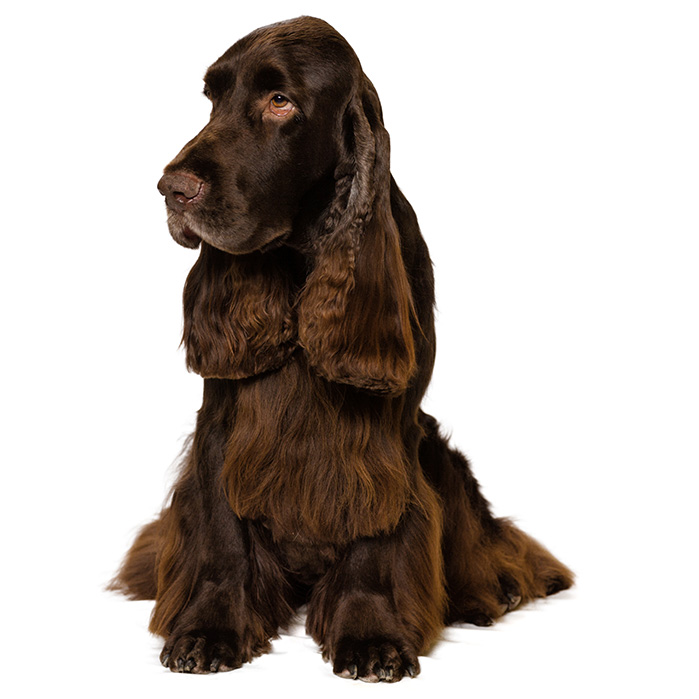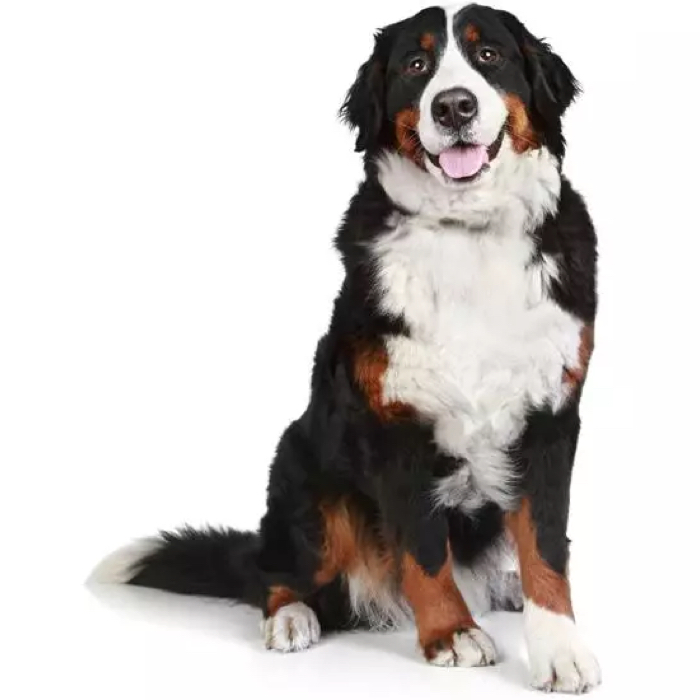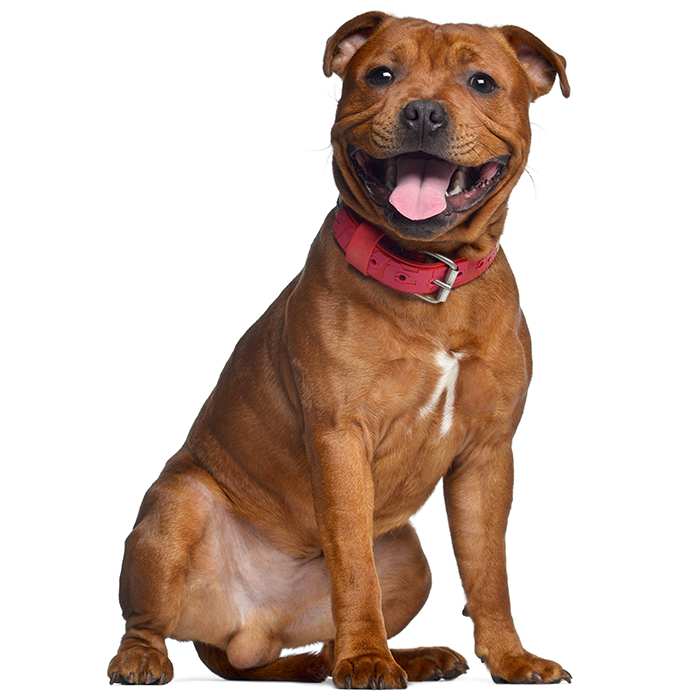Miniature Poodle
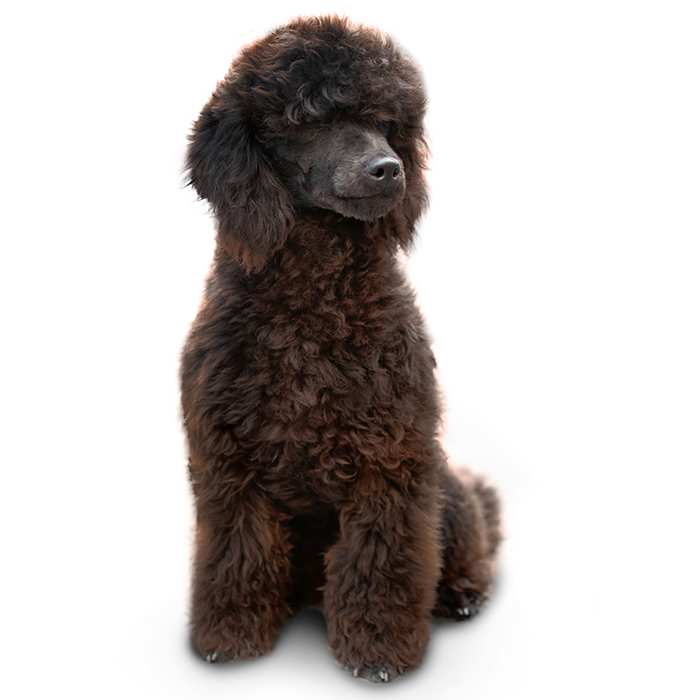

| Recommended for | Families, couples, singles, people with allergies |
| Breed Classification | Non-sporting group |
| Other names | _ |
| Lifespan | 12 - 14 years |
| Size | Small |
| Temperament | Loyal, loving, entertaining |
| Intelligence | Very high |
| Tendency to bark | Average |
| Maintenance Level | Medium (but high for grooming) |
| Health Risk | This breed has an around average probability of having health issues in its lifetime, hence it is one of the more affordable breeds to insure. |
Insuring a Miniature Poodle?
Get our award-winning Nose-to-Tail Cover with up to $30k annual benefit limit, up to 90% of eligible vet bills back, and no sub-limits.
Get a quick quote
Is this breed right for you?
Try our breed selector quiz to find out your best matching breed!
Insuring a Miniature Poodle?
Get our award-winning Nose-to-Tail Cover with up to $30k annual benefit limit, up to 90% of eligible vet bills back, and no sub-limits.
Get a quick quote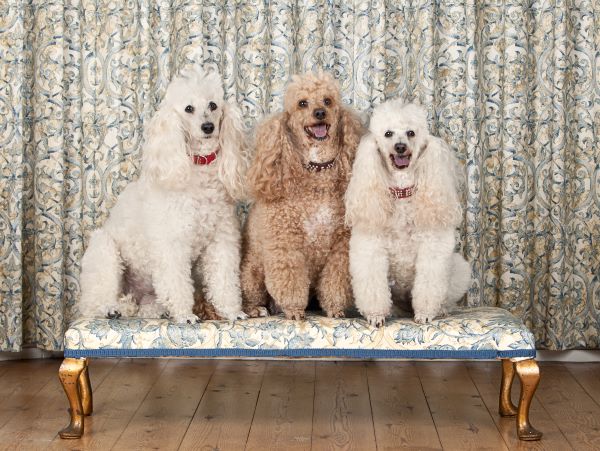
Breed history of Miniature Poodles
While Miniature Poodles are a more recent Poodle type, Poodles have been around for at least the last 400 years, and probably longer. They are the national dog of France, yet it is widely believed that the origins of the Poodle are actually German. Originally developed as a hunting dog that was bred to retrieve ducks and other water fowl from rivers and lakes, the name Poodle is most likely derived from the German word pudel meaning ‘splash in water’ or ‘puddle’.
Miniature Poodles were bred as a smaller version of the Standard Poodle by breeding smaller sized Standards with each other. One of the reasons for this was that the smaller dogs were easier to care for. In the past, Miniature Poodles were used as circus dogs because they were smart and easy to train. They were also useful for searching out truffles, the mushroom-like fungus popular in French cuisine.
The smaller sized Poodles became very popular with the aristocracy and royalty throughout the 18th and 19th centuries and the breed remains somewhat of a status symbol. After the Second World War the Poodle became one of the most popular breeds with families in the United States, and today Miniature Poodles remain extremely popular as companion animals.
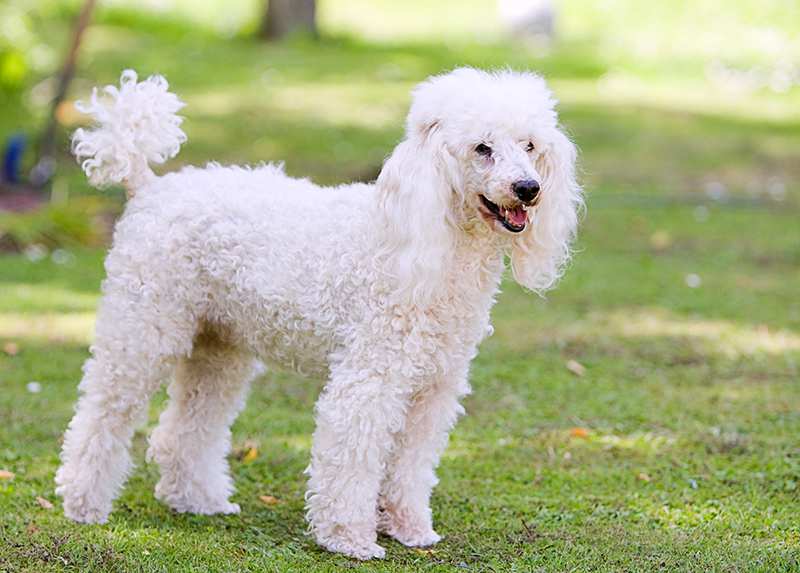
Physical description of Miniature Poodles
The Miniature Poodle is a small sized dog that was bred as a smaller version of the Standard Poodle, while being larger and less fragile than the tiny Toy Poodle. Both the female and male Miniature Poodles grow to between 28 cm and 38 cm tall and tend to weigh no more than 12 kg.
The Miniature Poodle coat does not shed and is hypoallergenic, so they are recommended for people who have allergies to dog hair.
Their coat comes in a variety of colours including blue, grey, brown, apricot, silver, and cream.
| Weight range | 6 - 12 kg |
| Height range | 28 to 38 cm |
| Colours | Any solid colour including black, white, cream, brown, silver, blue, and apricot |
| Coat length | Long |
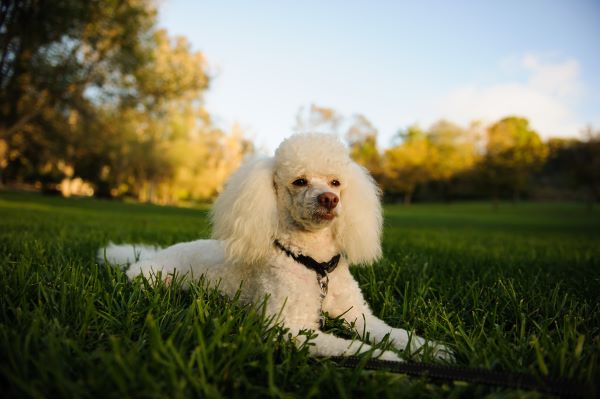
Miniature Poodle personality and temperament
Miniature Poodles have a loving, caring and kind nature. They love to feel like a part of the family, thrive on human companionship and do not do well if left on their own for extended periods of time on a regular basis. They may get into mischief if they’re not stimulated with games and exercise and can develop ongoing behavioural problems if not given enough human attention. The breed tends also to develop separation anxiety.
Miniature Poodles are very joyful, playful, alert, loyal and highly intelligent little dogs. Their friendly, smiling eyes and their smarts and willingness to learn make a lot of people fall in love with this cute little breed. Their elegant looks may make them seem a bit posh, but in fact Miniature Poodles just like to play and have fun. Given the chance they will happily roll in mud and go for a swim.
Like the smaller Toy Poodle and the larger Standard Poodle, they are natural performers who love to please. They enjoy the spotlight and make great circus and trick dogs who will thrive on the recognition of their talents. They will wow you with all the performance skills you teach them, and the louder the applause, the better the performance will be.
Like other breeds that were developed as hunting dogs, Miniature Poodles require a great deal of both physical and mental stimulation, paired with a strong yet fair owner who won’t allow any misbehaviour. They will adapt to all kinds of circumstances and will live happily in a campervan, apartment or mansion. They are very adventurous with a low level of aggression, so they are perfect to take everywhere.
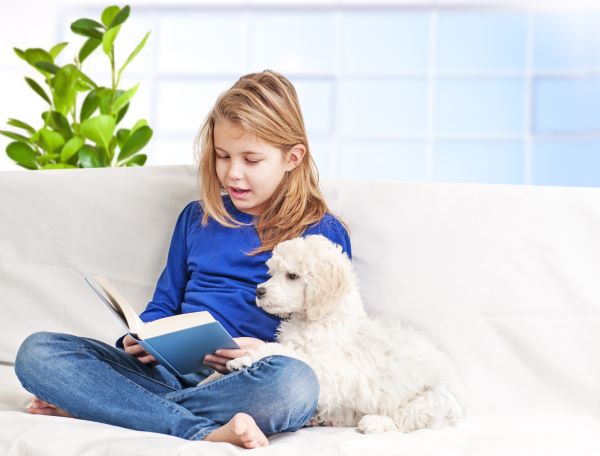
Miniature Poodles with kids and other pets
Miniature Poodles love human company and get along with children. While they are better suited to younger kids than the tiny and delicate Toy Poodle, younger children should still be supervised by a responsible adult as they could accidently injure them. Also, Toy and Miniature Poodles tend to be less patient with children than the larger Standard Poodles.
The Miniature Poodle gets along well with other pets, particularly if they are raised together and introduced in a proper way.
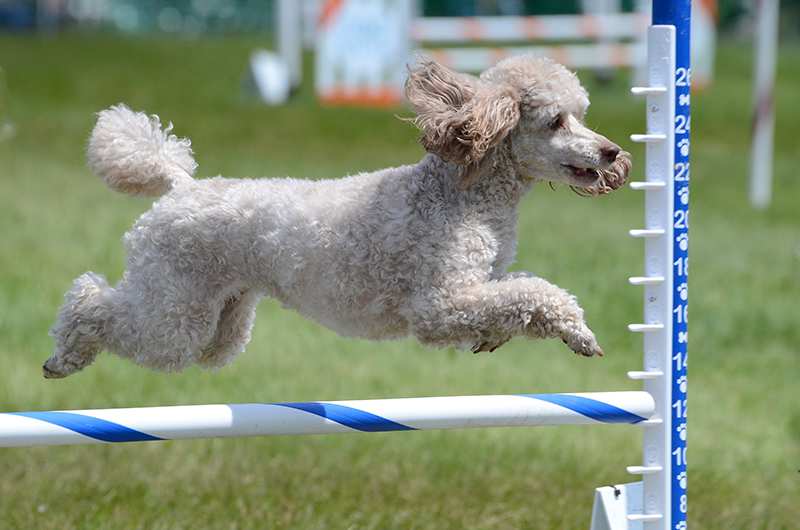
Miniature Poodle training and exercise
Miniature Poodles have a lot of energy, so they require regular daily walks. They are also highly intelligent, and also need regular mental stimulation in the form of games and interactive play. They love to be part of the action and enjoy getting out and about with their owners and having fun and adventures whenever possible. If you are not able to offer your Miniature Poodle much freedom, he will make his own fun, running around the garden madly or even doing a few circuits of the lounge (including sofas and chairs) to let off steam when necessary.
Miniature Poodles are very smart, so training them is easy. They are quick learners and don’t forget easily. Training from an early age is the best way to avoid behavioural issues down the track. Clear and simple commands are best, paired with firm, fair and consistent discipline. Often excelling at dog sports and obedience training, their intelligence and athleticism are wonderful traits, but must be managed carefully. A Poodle that is well-trained and not spoilt will prove a great companion animal.
| Energy level | High |
| Exercise requirements | High |
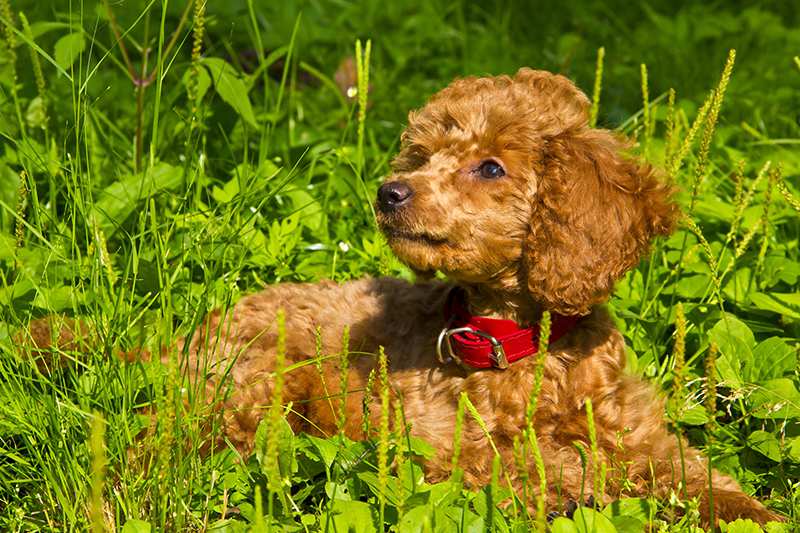
Miniature Poodle feeding and nutrition
The Miniature Poodle should do well on a high-quality, well-balanced diet that is appropriate to the dog’s age (puppy, adult, or senior), size and activity level.
Although they don’t tend to be greedy eaters, Poodles may become overweight, so it’s important to monitor their calorie consumption and weight level and adjust their diet accordingly.
Check with your vet if you have any concerns about your dog’s weight or diet.
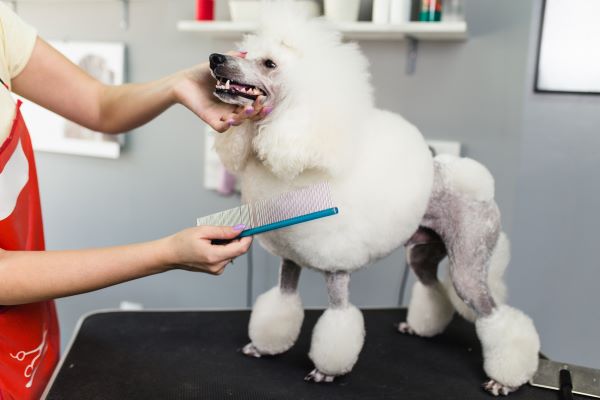
Miniature Poodle care and grooming
Potential Poodle owners need to be aware of the grooming costs and the need to have the Miniature Poodle professionally groomed regularly – every 6 to 10 weeks, depending on the style of trim.
The Poodle has a thick, curly, non-shedding coat all over his body. The various “hairstyles” the Poodle is known for have their origins in the poodle’s early hunting days. Owners would shear the legs of the poodles to make swimming less difficult, leaving fur only on the joints to guard against the severe cold of the water, as well as a jacket of fur on the body.
All Poodles require daily attention and regular brushing, bathing and trimming. Regular grooming appointments, along with a short trim such as the simple ‘sporting clip’ in which the coat is shorn to follow the outline of the body, will help to keep the coat maintained and reduce the amount of daily grooming required.
Daily brushing is highly recommended to prevent the Poodle coat from matting or tangling, and care must be taken to keep the eyes, ears (inside and out), mouth, feet and anal area clean.
A Poodle’s hair doesn’t stop growing, which is why regular and diligent grooming is so important. Poodles are easily stressed and poor grooming has often resulted in nervous animals and skin irritations. Be sure to use only recommended shampoos as well.
Health issues for Miniature Poodles
- Progressive retinal atrophy (PRA) refers to a family of eye conditions that cause the retina’s gradual deterioration. Night vision is lost in the early stages of the disease, and day vision fades as the disease progresses. Many dogs adapt well to the loss of vision, as long as their environment stays the same.
- Luxating Patella is an orthopedic condition that is more likely to occur in Toy and Miniature Poodles than in the Standard variety. One of the most common orthopaedic conditions in dogs and one of the most common causes of lameness. Luxating Patella occurs when the kneecap moves out of its normal position, causing pain and an abnormal gait. Owners may notice a skip in their dog’s step or see their dog run on three legs for a brief period. Mild cases generally do not impact too much on the dog’s life, but severe cases may require surgery.
- Addison’s Disease, or Hypoadrenocorticism, is a serious illness that is caused by the insufficient production of adrenal hormones by the adrenal gland. Poodles with Addison’s disease may have a poor appetite, appear lethargic and vomit. The symptoms of this disease are not always straightforward and it can be difficult to diagnose because its symptoms are similar to those of many other diseases.
- Cushing’s disease, or Hyperadrenocorticism, is one of the most common endocrine disorders that affects dogs. It is characterised primarily by overproduction of the hormone cortisol. Excessive cortisol in an animal’s body can do a lot of damage and may be life-threatening. It usually develops in middle-aged to older animals (7 to 12 years old). The disease is often insidious and slowly progressive.
- Hypothyroidism, or under-active thyroid, is a condition where the thyroid gland doesn’t produce adequate amounts of thyroid hormone, resulting in a slower metabolic rate. Some symptoms of Hypothyroidism include abnormal weight gain, dry skin, hair loss, ear infections, and lethargic behaviour. Hypothyroidism is the most common hormone imbalance occurring in dogs.
- Epilepsy is a general term for neurological disorders that bring on sudden and repeated seizures. Although it affects only 3% of dogs, Miniature Poodles are prone to idiopathic epilepsy, which are seizures with no known cause. The condition can usually be controlled through the careful use of prescribed medication.
- Hip dysplasia is a hereditary condition and common in many breeds. The hip doesn’t develop as it should, leading to an instable or loose joint. This often results in prolonged limping and eventually lameness in later life.
Not all conditions are covered by Pet Insurance. For details of Bow Wow Meow Pet Insurance cover, refer to the Product Disclosure Statement.
Thinking about insuring a Miniature Poodle
Thinking about insuring a Miniature Poodle
Learn moreThinking about insuring a Miniature Poodle
Learn moreFree engraved pet ID tag on sign up3
Customer Satisfaction
21 day cooling off
24/7 Live Vet^ care

GapOnly® in vet claims
MORE INFORMATION
The Poodle Club of NSW Inc: http://www.poodleclubnsw.com/
Poodle Club of Queensland Inc: http://www.poodleclubofqueenslandinc.com/
Poodle Club of Victoria Inc: http://www.poodleclubofvictoria.com/
Poodle Club of South Australia Inc: https://poodleclubsa.com.au/

